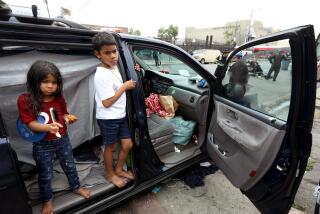A Pediatrician Who Goes the Extra Mile
- Share via
People ask her what such a well-trained pediatrician is doing at a clinic for low-income children, says Dr. Elisa Nicholas, the UCLA and Yale-trained medical and executive director of the Children’s Clinic in Long Beach.
“My answer is: They deserve the best care as much as rich kids, even more so. And how do you measure success? I think I’m successful.”
Her jampacked work schedule attests to that success. She sees low-income patients up to age 18 in the clinic, located at Miller Children’s Hospital at the Long Beach Memorial Medical Center. She performs the administrative duties for the nonprofit facility, which treats nearly 10,000 babies, children and teen-agers each year. She visits clinics--ones she helped open--at two local schools. During one recent week she also worked on a grant request and joined colleagues to meet with the district’s congressman to discuss children’s issues.
Since signing on in 1988, Nicholas has helped institute such enterprises as a clinic for the area’s large Cambodian-speaking population, a school-based child-care discussion group for teen-age mothers and a health-care program for babies born to drug users. Her paycheck covers 32 hours a week, but she usually works 40 to 50--having recently cut down to spend more time with her own two children, 6-year-old Tommy and 4-year-old Angelica, and her husband, Dr. Thomas Sedgwick, an anesthesiologist.
“I enjoy designing programs, implementing them and finding money for them,” she says. “I look at the needs and try to respond to them. When I came here, this was a wonderful clinic, but it did not do much in the community. So I started going out in the community.”
Still, she adds, “It’s important to have contact with the patients and the moms. I need the hugs.”
And hugs she gets, as the youngsters, their mothers and an occasional sibling maintain a steady parade through her examining room this busy Thursday morning. She talks forthrightly to the children without clowning or cloying.
“Oh, Vaneshea,” she says unhappily to 7-year-old Vaneshea Wright, who has an ear infection. “Look at that right ear. Yucko.”
Vaneshea giggles.
Another patient, 5-year-old Andrea Villa, has blood in her urine, discovered during a visit to a school-based clinic. Nicholas brought her to the Children’s Clinic and has recruited a volunteer nephrologist to treat her. Nicholas talks to Andrea’s mother in fluent Spanish.
“Hopefully, they’ll get the money for the lab work,” she says later. You want to do the work-up in the most cost-effective manner and still provide the level of care that’s necessary and appropriate. It’s always a challenge.”
She practices more than medicine in that small room, she says. “We try to be role models for the kids, because they’ve never seen doctors or professionals. We ask the older ones what they want to be when they grow up, because no one ever asks them.”
She fulfills another role as well: teaching her patients’ mothers to stand up for their children’s rights. “Many low-income moms are not highly educated. They don’t speak English. They don’t feel they have the right to be advocates for their kids, be it at school, or if they have special needs,” she says.
Because of a longtime interest in international health care, Nicholas, who has a master’s degree in public health, has volunteered in Uganda, Kenya and the Caribbean. Last summer she spent almost half of her family vacation in Fiji helping to develop a children’s medical program there.
“She’s the best pediatrician I’ve ever seen,” says Vaneshea’s mother, Demetrice Merritt. “She makes kids feel so comfortable, gives them such love and attention. She found out a lot about my daughter that I didn’t know.
Adds Debra Hursey, who serves on a parent advisory board Nicholas helped develop, “I’ve been to two other clinics, and they treated you like, ‘If you’re poor, you’re criminal. You better be real grateful for what we throw you.’ That’s not the case here. Dr. Nicholas makes sure people are treated well. It’s rare to see someone so caring, so committed. She’s a unique, special person.”
* This occasional column tells the stories of the unsung heroes of Southern California, people of all ages and vocations and avocations, whose dedication as volunteers or on the job makes life better for the people they encounter. Reader suggestions are welcome and may be sent to Local Hero Editor, Life & Style, Los Angeles Times, Times Mirror Square, Los Angeles 90053.
More to Read
Sign up for Essential California
The most important California stories and recommendations in your inbox every morning.
You may occasionally receive promotional content from the Los Angeles Times.













